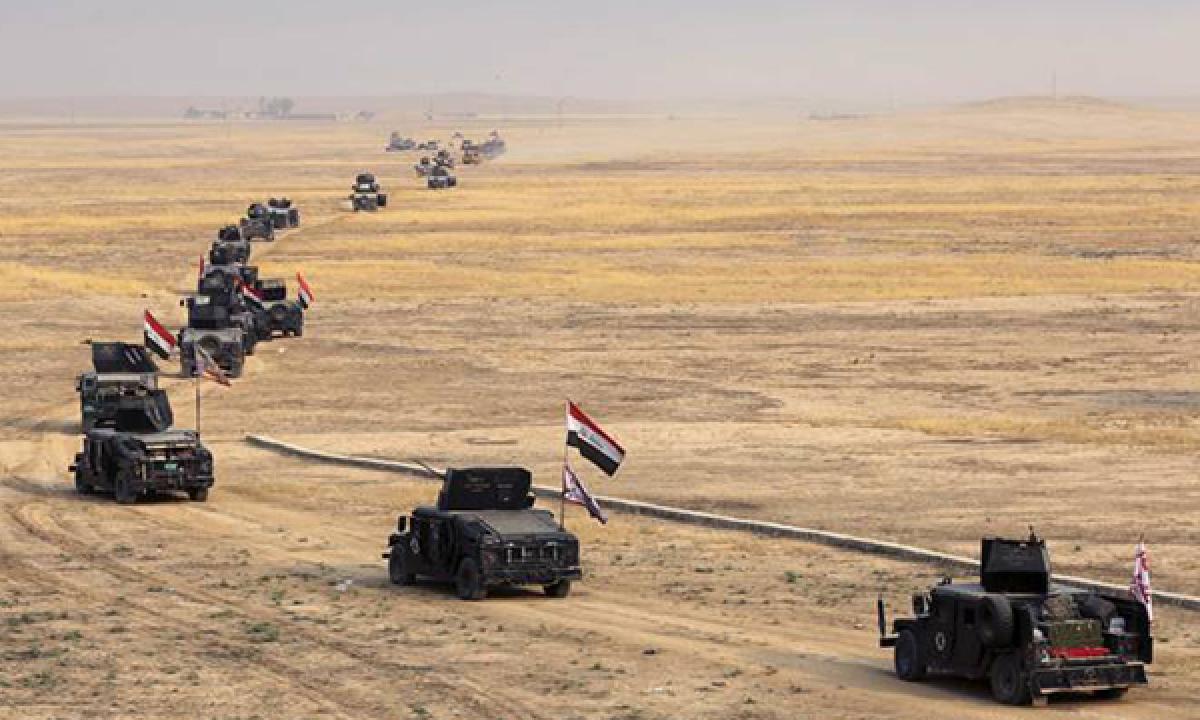Live
- Over 7,600 Syrians return from Turkiye in five days after Assad's downfall: minister
- Delhi BJP leaders stay overnight in 1,194 slum clusters
- Keerthy Suresh and Anthony Thattil Tie the Knot in a Christian Ceremony
- AAP, BJP making false promises to slum dwellers for votes: Delhi Congress
- 'Vere Level Office' Review: A Refreshing Take on Corporate Life with Humor and Heart
- Libya's oil company declares force majeure at key refinery following clashes
- Illegal Rohingyas: BJP seeks Assembly session to implement NRC in Delhi
- Philippines orders full evacuation amid possible volcanic re-eruption
- Government Prioritizes Welfare of the Poor, says Dola Sri Bala Veeranjaneyaswamy
- Two Russian oil tankers with 29 on board damaged due to bad weather
Just In

The first thing Iraqi teenager Afrah did when she escaped Islamic State (ISIS) captivity near Mosul was to remove her face veil and throw it defiantly to the ground. The ultra-hardline militants kidnapped and used Afrah, 16, her older sister Asil and 14 other family members and relatives as human shields when they withdrew from the Iraqi city of Tikrit, her hometown around 200 km south, early
The first thing Iraqi teenager Afrah did when she escaped Islamic State (ISIS) captivity near Mosul was to remove her face veil and throw it defiantly to the ground.
The ultra-hardline militants kidnapped and used Afrah, 16, her older sister Asil and 14 other family members and relatives as human shields when they withdrew from the Iraqi city of Tikrit, her hometown around 200 km south, early in 2015, For a year and a half the family was trapped in the village of Bawiza just north of the jihadists' Iraqi stronghold. The girls tried to keep a low profile and barely ventured outdoors.
When Iraqi forces pushed into the village a few days ago, part of the US-backed campaign to oust Islamic State from Mosul, they were determined not to be taken hostage again, and rushed towards the military's armoured vehicles.
Having survived the militants' oppressive rule, Afrah and Asil, 19, want to put the harrowing experience behind them, return to Tikrit, resume studies, work and get their lives back. "I've lost two years of my education. I want to get back to school, complete my studies and then qualify to become a dentist," Afrah said.
Asil, for her part, wanted to go back to her job issuing food hygiene certificates to restaurants and cafes. "I loved that job, I can't wait to start again," she said.
The two sisters spoke as they waited in the desert alongside hundreds of other displaced Iraqis trying to cross into Kurdish-controlled areas a few kilometres northeast of Mosul.
Explosions could be heard coming from the city, as the campaign to drive ISIS out continues with fierce street battles between the militants and Iraqi forces. Islamic State has taken civilians hostage to avoid being targeted by air strikes, has executed people in Mosul, used women from religious minorities as sex slaves and enforced its conservative rules on others using female religious police.
"If you dared not to wear a niqab (face veil), you'd get a fine on the first occasion, around 50,000 dinars ($40). After that, they'd beat you as punishment," Afrah said.
"I hardly went out, I slept, ate, that was it. A few months ago they cut off the internet, too. It was boring. I didn't want to go to one of their schools where they teach you only about weapons and religion," she said.
NEARLY AN ISIS BRIDE
Afrah wore a long brown coat and bright woolly hat. She said she would continue to wear the Muslim headscarf but was relieved to show her face again. Asil had also shed her niqab.
The elder sister narrowly avoided being married off to an Islamic State fighter while they lived in Bawiza, she said.
"Dad refused to give the guy my hand in marriage," she explained - a dangerous act of defiance that nearly got her father Saeed killed. "The fighter who wanted to marry Asil accused Dad of being a spy, and they took him for trial," Afrah said. "The fighter was gross, old with a big beard," she added.
Afrah, who speaks some English and who the family say is their technical whiz, had the presence of mind to delete all Saeed's contacts from his phone, starting with relatives or friends who had served in Iraq's security forces.
Without enough evidence and because the ISIS fighter was not high-ranking, Saeed was let go. "They'd have cut my head off," he said.
A few months later they learned the fighter had been killed in battle. "That dog is dead," Saeed said, standing next to Asil.
A relative had not been so lucky, they said, pointing to a woman sitting nearby on a tarpaulin sheet with the rest of the family. ISIS, often referred to by the Arabic acronym Daesh, had executed her husband because he was a former policeman.
The family stocked up on blankets and warm clothes for winter, anticipating time displaced in a camp somewhere. They do not know when they will be allowed into Kurdish-held territory, and how long it will take after that to get home. "Hopefully we can return soon," Asil said. "Girls who lived under Daesh just want to resume their lives."

© 2024 Hyderabad Media House Limited/The Hans India. All rights reserved. Powered by hocalwire.com







